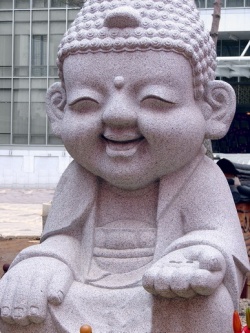The Five Precepts, Supporting Our Relationships
When we bring a deeply caring and respectful awareness to the way we interact with one another, we change our social relationships from a source of confusion and pain to a vehicle for personal and social transformation. Spiritual awakening, in every tradition brings this transformation of our actions from limited self-interest to a joyful, open response to all of life, an inclusive love and appreciation. In the Buddhist tradition, this move is described as the five precepts. These precepts involve training our speech and actions in order to serve our inner and outer harmony. The precepts speak to areas of life that are the source of our greatest pleasure, joy, and happiness as well as our greatest fear, pain, and confusion. In brief, the five precepts are commitments to non-harming, to sharing, to supportive relationships, to speaking carefully, and to keeping the mind clear.
The fundamental practice of the precepts is this: by paying careful attention to how we speak and act, we notice the effect such behavior has on ourselves as well as others. If we notice that our behavior causes pain, can we gracefully give it up, or will we remain caught in an old habitual way of reacting? This is the challenge of practicing the precepts.
We are not asked to submit to an authority or any “one way” of behavior, but rather we are asked to look as carefully as we can and see for ourselves. The workhorse of this practice is attentive awareness, or mindfulness. When we notice that pain results from something we have said or done, there is no threat of punishment or condemnation, but rather we acknowledge the unhappiness we have caused. It is then seen to be in our larger, more authentic self-interest to adjust our behavior so as to minimize the pain, confusion, or insecurity. This is not a grudging submission to an imagined authority. The restraint of our behavior is undertaken willingly, out of interest in the happiness of all.
1. A COMMITMENT TO NOT HARMING.
Refraining from killing is an obvious place to start caring for other beings. The first precept asks us to look at how our behavior harms others. Can we acknowledge that we play a part in the chain of causation that leads to the death of other beings, animal as well as human? If we do not take an active interest in seeking the truth, we may live our lives believing that this suffering is just someone The Five Precepts (Voices of Insight Chapter).doc 2
else's problem.
Did the war in Kuwait have anything to do with the miles per gallon of the car you prefer to drive? Does the massive use of pesticides and herbicides now polluting our environment have anything to do with what you prefer on your table for dinner? When men and women undertake the renunciate life as Buddhist monks and nuns, they are admonished not to kill any living thing. At the time of the Buddha, the immediate and obvious effect of this rule was to prohibit them from killing animals directly as well as accepting the meat of animals that had been killed and prepared specifically for them. Less obvious implications went so far as to prohibit them from digging in the ground, or even scuffing their toes in such a way as to disturb the beings that might be living there.
Most of us have not undertaken a life of renunciation that monks and nuns have. But we still must ask ourselves if we can live our lives with care and consideration for the life around us. To the extent we do awaken to the vast web of life, we have the opportunity to contribute to less suffering in the world. Where I grew up in central Maine, nearly every father teaches his sons and (increasingly) daughters both how to handle guns and the joys of hunting. This is the cultural norm that we were all raised within.
I have a close friend who grew up in this way, and he told me about his last experience hunting alone. My friend had been a hunter for some time, and he had always appreciated the quiet time in the forest that this activity afforded. On this particular day he was hunting deer alone, walking along a deserted logging trail. As he silently came up over a small knoll, he came face to face with the object of his hunt. In the rush of recognition and excitement my friend steadied his attention on the deer and, in a flash, saw clearly. When he looked into the eyes of the deer, he saw the being within. In that moment he was unable to bring himself to shoot to kill.
In hunting, there is a term, "buck fever," which is used to describe the nervous excitement felt by a novice hunter at the first sight of game. My friend's buck fever, however, was a unique awakening, rather than the customary paralysis with the target in the gun's sights. My friend became aware of his feeling of connection, aware of his place in a larger circle of beings, and was unable to bring himself to harm the deer. This quality The Five Precepts (Voices of Insight Chapter).doc 3
of heart is subtle and delicate, and very real. My friend awoke to his sense of respect and consideration.
In the Buddha's teaching, there is a quality called hiri, defined as modesty or fear of doing wrong by causing harm to oneself or another. The Buddha identified this as a wholesome quality of heart to be developed on the path of awakening and as one of the necessary foundations for a harmonious communal life. Cultural conditioning may obscure hiri but cannot remove it from the heart.
Modesty is a refined attunement to what makes our heart contract and tighten, or remain open and aware. When we are about to do something and we feel a sharp question of propriety, or a subtle lingering anxiety, we feel unsure of the appropriateness of such behavior. This quivering of the heart is a call to awaken, a call to acknowledge our own discomfort with our intended behavior. If it makes us feel queasy, it will surely be felt by others in the same way. We ourselves are feeling this quality of heart. This quality of heart is innate within ourselves. We need not attribute the fear of doing wrong to some omniscient deity standing judgment over us.
It can be difficult to feel such sensitive quivering; many of us are insensitive to what behavior causes the suffering of separation, isolation, and fear, on the one hand, and what behavior brings openness, connection, and friendliness, on the other. To make it more difficult, there is often no universal agreement separating appropriate from inappropriate behavior in our culture. Therefore, it is our responsibility to make this distinction wisely. The key is mindfulness, paying very careful attention to our experience.
Undertaking the precepts as guidelines for behavior sets the stage for looking carefully at all of our life. It is only when we look that we can uncover other areas where we have not yet awakened by our own experience of "buck fever." In this discovery we awaken to the pain that habitual behavior may mask.
Even when we do see the pain, we may find it hard to restrain the habitual, even accepted behavior that has become compulsive. Self-restraint is empowering oneself to act differently. By restraining compulsive behavior, we conserve and consolidate mental and physical energy. Such consolidation allows our focus to remain steady, resulting in greater strength, cohesion, and confidence.
The Five Precepts (Voices of Insight Chapter).doc 4
2. A COMMITMENT TO SHARING. We live in a culture and time awash in material goods promising to make us happy. The pressure to acquire the many items we are told we need is incessant. Often we may be tempted to resort to less than noble or honest means to acquire them.
The second precept involves refraining from taking what is not freely offered. In its most elemental form it means not stealing or taking another person's property without his or her informed consent. In order to break this precept, we must scheme to get something by deception, strength, or stealth. In the traditional texts of Buddhism this is called “having a thievish intent.”
Our legal system makes a distinction between petty theft and grand larceny. The sole distinction is the magnitude of the resultant loss or harm. However, when we look carefully, we see that the thievish intent to acquire something improperly is the same in both cases. Acquiring material goods in such a way causes harm to others and creates disharmony in our neighborhood, whether it is local, national, or international. Most of us are careful enough not to commit grand larceny even if strong desire should arise in the mind. But are we equally sensitive to our intent when the opportunity arises to take more than full legal advantage of our employer's supplies, our expense allowance, or our federal tax deductions? The material benefit we gain from such a petty action is far outweighed by the substantial damage we do to our heart. When we act against our heart's sensitive recognition of what is wrong, we sow the seeds of disharmony within and without. When we act against our heart’s sensitive recognition of what is wrong, we sow the seeds of disharmony within and without, experiencing confusion and isolation. This makes our hearts tense and fearful.
Though we may not personally act on thievish intent, we may discover that we are the beneficiary of others' use of stealth, force, or deception. With the widespread reports of slave labor throughout the world, should we inquire if we are the recipients of any benefit from this forced labor? Was the Persian carpet in our home made by child labor in India? Did forced labor in China contribute in any way to the silk clothing we now wear? When we ask these questions, we awaken the quality of heart that the Buddha called ottappa, which means conscience, or the shame of acting in such a way that brings harm to another. This conscience is the quality that respects others’ sensitivities, The Five Precepts (Voices of Insight Chapter).doc 5
vulnerabilities, and limits. As members of the human family, the world community, we are affected by everyone's actions. Opening to others’ feelings and sensibilities puts our heart in touch with theirs. Knowing and caring how others feel helps instruct us in what we say and do to minimize pain and suffering.
When we act with a limited, personal self-interest, with an "I could care less!" attitude toward others, our heart contracts and tightens, becoming insensitive and numb in the process. This causes us and others painful feelings. When we act in such a way as to cause ourselves to feel ashamed, secretly hoping that others do not know or suspect this behavior of us, our heart also tightens and shuts down. In that movement we feel isolated and cut off from others. We do this to ourselves.
Opening our heart to acknowledge the pain, fear, and confusion conditioned in others takes a steadfast fearlessness, and it takes practice. It is a courageous process to develop the ability to feel our own fear and isolation without judging it as bad, denying it with bravado, covering it up with affirmation, or acting it out with blind blaming.
As we become familiar with the ways of our heart, our conscience awakens us to the effect of our actions on others. Exercising restraint of behavior that causes painful feelings in others requires a discipline of commitment as well as energy. By awakening our intention not to take anything away from another being, we strengthen the foundation of our community.
A commitment to this precept doesn't necessarily mean going without; it means knowing what is enough. Can we look at our busy and full lives to discover what we have in excess? Can we allow ourselves to feel the pain of those who must go without? Can we awaken to the wisdom of renouncing possession of more than enough? Can we be content with what we now have?
When we choose to work with the precepts, we look very carefully at our commitment to not harming and to sharing. In this exploration, we awaken and recognize the presence of modesty and conscience within our hearts. The Buddha called these two qualities the foundations of morality, and the guardians of the world. 3.
MAKING AND KEEPING CLEAR RELATIONSHIPS.
We have probably all felt the emotional sting of hurtful sexual behavior by another. In our own self-absorbed pursuit of fulfilling personal desires, many of us have also acted in ways that cause similar pain, The Five Precepts (Voices of Insight Chapter).doc 6
fear, or insecurity in another.
Undertaking the third precept involves practicing restraint from acting out sexual energy in a way that causes harm to another. This is not a moralistic injunction against mature adults living a full, enjoyable, sensual life. Rather, we develop sensitivity to that personal behavior which, obviously or subtly, causes insecurity, fear, shame, humiliation, disempowerment, jealousy, ore other painful feelings to arise within our own heart or the heart of another.
Undertaking this precept is not a capitulation to a moral or spiritual authority, nor is it an ego-investing, self-imposed spiritual ideal. It is a commitment of interest and energy to awaken to our choices and what conditions them. Whether we are aware of it or not, we choose the nature of our relationships with each other. We make commitments based upon shared understandings and expectations. We affirm our connection with all others by honoring our individual commitments.
A primary element of commitment is mutual knowledge. A clear basis for any agreement or commitment between individuals, or with ourselves, is essential. Clear definitions and boundaries support agreement. Vague relationships lead to confusion and undermine our ability to keep the commitment.
When there is difficulty in articulating the conditions and limits of any relationship, the difficulty must be faced. By being honest we might well expose a terrible fear roaring in our heart. To face it takes powerful strength of mind and confidence.
Every individual has different experiences informing his or her understanding and preferences, and so it is often difficult to reach consensus. In this case it is our responsibility to observe and learn from our most intimate experiences what is the source of joy and pain. When we recognize a behavior that causes ourselves pain, we can be sure that others feel pain with that behavior also. Understanding this effect of our actions encourages and supports us in making commitments to avoid it, and then choose a different behavior.
Actions taken in isolation, actions that fail to recognize our interconnection, damage the tapestry of our communal life. We then estrange ourselves from the community because we have fractured the bonds of safety upon which our community The Five Precepts (Voices of Insight Chapter).doc 7
rests. Only by repairing them can we then feel the safety of the community as a whole again. This is done by openly acknowledging the behavior, forgiving the actor, and reconnecting with the love and respect necessary for trust. Then the communal tapestry is mended.
4. SPEAKING CAREFULLY: THE POWER OF INTENTION.
We speak a lot. Our habits in speaking are extraordinarily strong. The fourth precept addresses the fact that a large part of the work of preserving communal harmony rests on the spoken word. Before we make any move to speak or act, an impulse arises in the mind. Embedded within this impulse are either the roots of skillfulness that condition happiness or roots of carelessness that condition suffering. One vital factor in this impulse is our motivation, our intention. When we pay careful attention, we discover how elusive and indistinct our rationale can be. We need to open the mystery of our motivations in order to understand what fuels our actions. With that knowledge we can act to cut the deep roots of carelessness, disrespect, and self-interest, and then nourish the equally deep, though perhaps atrophied, roots of wakefulness, love, and generosity. When we undertake to train our speech in order to create harmony, trust, and safety in our communal relationships, we also examine the resultant effect of what we say and how we say it. To help us in our exploration, the Buddha enumerated five conditions of speaking to attend to, five ways that we can awaken to the power of our words to cause pain or condition happiness.
First, when we speak with a friendly heart, what we say is more likely to be heard. When love, respect, and care are the foundation of what we say, we acknowledge our connection with others. Acknowledging these relationships, we must not deceive, beguile, or slander. Such speech only places obstacles between individuals, separating them from one another.
By taking a moment before speaking, we can evaluate our intention so that we may choose to speak as a peacemaker rather than carelessly encouraging further agitation, tension, or division between individuals. Choosing sides in interpersonal conflicts is a habit that rarely helps to resolve the conflict. By speaking of reconciliation, resolution, and harmony, we encourage and support letting go of strong opinions and judgments. Renunciation of opinions brings immediate relief. The Five Precepts (Voices of Insight Chapter).doc 8
In a moment before speaking, we can let the impulse to articulate judgments pass. When we speak our judgments, we solidify them and make them more difficult to let go of later. By letting the judgment remain as a thought, we do not nourish it, and it will pass quickly, leaving little residue in the mind.
Second, words spoken gently are more likely to be heard and their true value felt. It is especially important that we speak in a nonthreatening, nonaggressive way when what we need to say will be difficult for another person to hear. Speaking gently allows our words to be received even in difficult circumstances. Speaking belligerently, forcefully, or loudly when we want to get our point across rarely has the intended effect. Rather, it may belittle, shame, or cause the listener to be afraid. Careful attention to the moment when we feel the impulse to speak awakens us to the possibility of speaking so that we reach the heart of the listener.
We can create intimacy and openness with our words by speaking softly in an affirming way. The fabric of our community is as fragile as the intention of any single member. One person can create harm and division in any group by careless and malicious talk. It is our responsibility to monitor our speech so that we do no harm. The third element of wise speech that preserves the harmony of community is truthfulness. It is said that the Bodhisattva, the being who became the Buddha, through innumerable lifetimes never broke this precept. After all, this path of awakening rests on acknowledgment of the truth.
Ask yourself, "Can I make a commitment to always tell the truth?" This may be difficult to agree to. Then ask yourself, "Am I a liar?" That is not easy to acknowledge either. So what do we do? Tell the truth when it is convenient? Refraining from false speech takes a firm commitment to the truth.
Gross lying is speech that is false, spoken with full intention to deceive others, to their emotional, physical, economic or social detriment. This deception misleading others is an act of disloyalty to the peace of our heart. Deliberate lying out of envy, jealousy, desire for gain, fear of another's judgment or position, or any other self-serving motive fuels an attachment to a sense of self that does much more harm than any temporary benefit received.
When we speak the truth, we come to be known as one who can be relied on, one The Five Precepts (Voices of Insight Chapter).doc 9
who is dependable, believable, and honest. The boy who cried "Wolf!" when there was no danger left the whole community without protection and exposed to a real danger when the wolf actually did appear. We do the same with our false speech; we leave ourselves and our community exposed to the danger of deception. It is unfortunate that we cannot look to our contemporary social or political mores to guide us in this arena of life. All around us we see deception in advertising, politics, and personal lives. This lack of integrity in speech conditions cynicism, disrespect, confusion, and disbelief. Though the truth is elusive and difficult to discover, our situation is as the Zen monk Ryokan says:
“If you speak delusion, everything becomes a delusion; If you speak the truth, everything becomes the truth. . . . Why do you so earnestly seek the truth in distant places? Look for delusion and truth in the bottom of your own hearts.* Even if what we say is true, a fourth condition of wise speech is whether it will be beneficial and useful to another person. So much of our talking is out of nervous habit, useless chit-chat for no purpose other than to fill up an uncomfortable silence. Useless, frivolous, foolish, or nonsensical chatter is called samphappalapavada in Pali. Included in this category is gossip, which for the most part is useless, potentially harmful, and not of benefit to anyone.
You might ask, "What is the harm in light banter and friendly talk?" To the extent that it may serve to initiate contact and connect us to another in a friendly way and leads toward other, more meaningful talk, there is no harm. But any activity may become a habit. Resorting to frivolous or useless chatter may lead others to consider what we have to say as insignificant. We may find ourselves unable or unwilling to speak openly about deeper, often more difficult heartfelt matters. The Buddha said, "Better than a thousand hollow words is one word that brings peace."
- One Robe, One Bowl: The Zen Poetry of Ryokan, translated by John Stevens (New York: Weatherhill, 1988), p. 50.
The Five Precepts (Voices of Insight Chapter).doc 10
The fifth element of wise speech is speaking at the proper time. It is essential that one be prepared for the impact of one's own words, sensitive to the other's state of mind, and aware of any other attendant conditions. This may be the most challenging aspect of wise speech. It requires patience and discernment to determine the time when what we have to say for the benefit of others can be heard by them. When I was a monk practicing in a Burmese monastery, my teacher U Pandita used to say, "Nothing is accomplished without patience."
With practice we learn that wisdom is not the manipulation of conditions to get what we want - not “being in control,” but rather the alert waiting for conditions to favor and support what we have to do. In this way, the restraint imposed by patience supports wise speech. It is often not easy to forbear the heat of our anger and attendant selfrighteousness. But angry speech conveys only the energetic intensity of anger. It is rarely effective communication.
It is better to wait a day to let your anger cool down before expressing the cause of your hurt and the resulting anger to the apparent source. Renouncing the gratification of immediate expression and dumping of anger goes a long way toward preserving the peace and harmony within and without. A commitment to wise speech relies on very precise attention to the impulse to speak as well as the motivation in speaking. Patience and perseverance are the keys to success. Being willing to begin over and over again with our commitment every time we discover behavior that is less than admirable means that moment by moment we are confronting and renouncing deeply rooted unskillful habits.
When, as a monk, I renounced control of my finances, an unintended consequence was that the lay supporters of the monastery became very attentive to what I might need or want. Burmese dharma devotees are extraordinarily generous in their support of monks, nuns, meditation centers, and monasteries. I discovered that if I gave the slightest indication of needing anything, or if I even admired or appreciated another monk's umbrella or sandals, lay supporters would take that as a hint that I would appreciate similar things. They would return in a day or so and with great respect and delight offer them to me.
Within a short time I had more than enough. I became very circumspect in speaking appreciatively about anything. I became sensitively aware of the subtle, and not The Five Precepts (Voices of Insight Chapter).doc 11
so subtle, ways I could get my wants satisfied. My wants became distinctly apparent as more than a need. Renunciation of financial self-support reinforced renunciation in speaking, which in turn encouraged a greater renunciation of material wants. The effect of such cumulative renunciation was a subtle joy, steady confidence, and tranquil ease for living so lightly on this earth.
5. KEEPING THE MIND CLEAR.
We all have deeply rooted habits that can manifest as compulsive behavior. Perhaps we have an addiction to excitement, pleasure, numbness, thrills, or any other compelling experience. When not seen clearly, these habits then become obsessions. We often feel powerless in the face of our addictions as we struggle to escape their debilitating effects.
By undertaking the fifth precept to abstain from using intoxicants, we confront the tenacious and obsessive addictions of the mind. This precept traditionally refers to the use of physical drugs and alcohol that cloud our awareness. Some substances are determined to be physically addictive and harmful, such as alcohol, drugs, and nicotine. When we look carefully at what affects our judgment, we can then broaden our understanding of the domain of the fifth precept to include our attempts to free the mind from all compelling, obsessive behavior, whatever the source.
To the degree we act obsessively, we are not free. The joy of freedom is undeniable. It is also fragile. Therefore, it is important to see that a broader application of this precept includes confronting all obsessively addictive behaviors. We limit ourselves through addictive behaviors and thought patterns. We can change. A commitment to grow rooted in knowledge, sincerely and repeatedly remembered, gets real when we arouse confidence and energy. Activating the body and mind to at least try is the first step. You will never know what can be accomplished if you never try.
This process also draws on the power of wisdom and determination. A considered decision to abstain from some harmful behavior has tremendous power when made with awareness of the consequences and with a sincere commitment. It steadies the mind when the opportunity to indulge is presented. The commitment allows a moment's pause in which alternatives can be considered. It is a turning away not out of fear or spiritual guilt, but from a decision that we reaffirm each time conditions present the choice. With The Five Precepts (Voices of Insight Chapter).doc 12
practice, confidence in our ability to make consistently wise choices begins to stabilize. When our daughter was at the age of exposure to new behaviors such as smoking, drugs, and sex she behaved like any normal, healthy teenager following her curiosity about the world, searching for meaning and discovering her personal boundaries. It was not our parental responsibility to somehow try to keep her unaware or naive of the conditions in the world. Our task was to encourage her to act responsibly and to let her know what we considered reasonable limits at her age.
She was determined to discover what her world looked like. We encouraged her to consider what she could make of the innumerable opportunities available to her. We could not support all of her choices. In time, however, when she saw that some behaviors were foolish, reckless, or dangerous, she outgrew interest in those activities. Of course, we tried to guide her and explain to her the dangers of these behaviors and the benefits of our preferences. At times we pointed out what we saw as the dangers, the limitations, and the pain her behaviors caused. She listened patiently and acknowledged that she had to explore and ultimately decide for herself which path she would take. We all have to decide for ourselves which path we take. With that selection we say yes to some and no to others. There is no shame in stating our decision when it comes from wise choice. Recognizing the truth for ourselves, and then having the integrity, energy, and fortitude to walk our talk, strengthens our commitment to awaken from the bondage of blinding habits.
On a recent month-long retreat, one participant was celebrating her twentieth anniversary in Alcoholics Anonymous, twenty years of renouncing harmful behavior. She said that even though her momentum of renunciation was strong, it was still a day-to-day challenge. A commitment is not a one-time event. Commitment requires repeated affirmation of intention, the diligent application of mindfulness, determination, energy, and wisdom.
While living as a monk in a Burmese monastery, I once, out of carelessness, broke one of the major rules, a rule that required a confession, penance, and lengthy probation and re-admittance to the monkhood. I was ashamed of my behavior, but more than that, the feeling of being separate from the other monks was painfully isolating. Because I so much appreciated the opportunity the monkhood afforded me for The Five Precepts (Voices of Insight Chapter).doc 13
practice, I wanted to remain a monk in good standing. When I felt how isolated I was and how agitating my behavior was to my practice, I resolved to repair my relationship with the other monks by renewing my commitment to the rules of monkhood. But I was afraid that when I confessed my misdeed, I would be ridiculed, judged, humiliated, and shamed by the other monks. I was most afraid of what I imagined would be the fierce condemnation of my preceptor, Sayadaw U Pandita.
When I gathered the courage to go see him and tell him about my behavior, he received my confession without any display of judgment or condemnation. He matter-offactly told me what procedure of penance and probation I would have to go through. The procedure for reconciliation was explicit. It was clear what I would have to do. When I arrived at the appointed time and place, I was met by three other monks who were also going through a similar penance and probation. I immediately did not feel so alone, but, more important, I recognized that I was not the only one who took commitment to monastic vows seriously.
I went through a week of isolation and separation from the other monks, and then I was readmitted in a very formal ceremony. The formality of the process in no way diminished the humility I felt undertaking it. What I discovered in this experience was that having a clear understanding of my agreement with the other monks allowed me to fulfill my commitment to them and myself. Instead of being a humiliating, shaming, and guilt-inducing requirement, the combined confession, penance, probation, and ceremony of re-admittance was an empowering act of reconciliation, reconnection, and recommitment. Equally important, my public expression of regret with my behavior indicated to the whole community of monks how much I valued the opportunity to live among them. I reaffirmed that I would sincerely try in the future to act in ways conducive to the preservation of harmony and faith among us.
I felt not only relieved but exhilarated and buoyed by the love, acceptance, and goodwill wishes of the other monks. This was a vital lesson in how the fabric of community is woven, rent, and repaired. By respecting and reaffirming our personal commitment to our individual and communal agreements, we preserve the foundation of safety and harmony so necessary for the opening of the heart. [Originally published in Voices of Insight, ed. Sharon Salzberg, Shambala)














